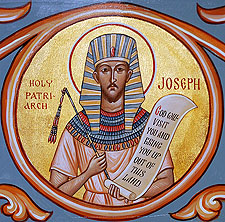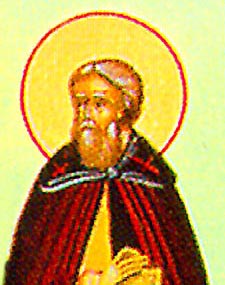|
|||
|---|---|---|---|
| This weekly bulletin insert complements the curriculum published by the Department of Christian Education of the Orthodox Church in America. This and many other Christian Education resources are available at http://dce.oca.org. | |||

Saint Nicetas the Confessor was born in the 8th century in Bithynia (Asia Minor) to a family of dedicated Christians. His parents were devoted to one another. Nicetas' mother died when he was only a few days old. After that his father decided to enter a monastery, leaving his son to be raised by his grandmother. So even though his father was alive, Nicetas didn't have the chance to grow up with him at home. Genesis 49: 33 to 50: 26 tells part of the story of Joseph, the favorite son of his father Jacob. Joseph also was deprived of the chance to be with his father. His jealous brothers sold him into slavery, and he wouldn't see Jacob again for many years. The absence of their fathers is one of several parallels between Nicetas and Joseph. Nicetas' grandmother saw to it that he finished school, but after that he was determined to become a monk. He went to the monastery at Midikion, and spent the next years in prayer and spiritual effort. He made close friends and became an example of holiness to the other monks. Their admiration was so great that when their abbot Nicephorus died, Nicetas was the unanimous choice to be his successor. Joseph's circumstances were very different from those in which Nicetas lived. But he too gained the respectful admiration of the people around him by being honorable and taking his work seriously. He was bought by an Egyptian named Potiphar, who recognized his ability and "put him in charge of all that he had." Joseph rebuffed the efforts of Potiphar's wife "day after day" to seduce him, refusing to betray his master and to "do this great wickedness, and sin against God." The result was that she made false accusations against him, and he was put in jail. But even there he was so admired that the keeper committed all the prisoners to his care. Saint Nicetas was also unjustly imprisoned, and persecuted for refusing to betray his faith. He would not support the iconoclasts or the corrupt patriarch appointed by the emperor. In prison, like Joseph he encouraged and kept up the spirits of other prisoners. God gave Saint Nicetas wonderful gifts. He healed physical and mental illnesses, and delivered people from danger through his prayers. When he died, people received healing by touching his body.
Joseph was not a miracle worker. But he was given the gift of forgiveness, and the gift of vision to see God's plan for Israel's future. Reunited with his brothers, Joseph told them that though they had meant to do evil to him, God "meant it for good, to bring it about that many people should be kept alive, as they are today." Saint Nicetas and Saint Joseph show us, through their similar experiences, that God continues to unfold His plan down through the centuries. Now we are the ones who can use His gifts to carry the plan forward for those people still to come. |
|||

